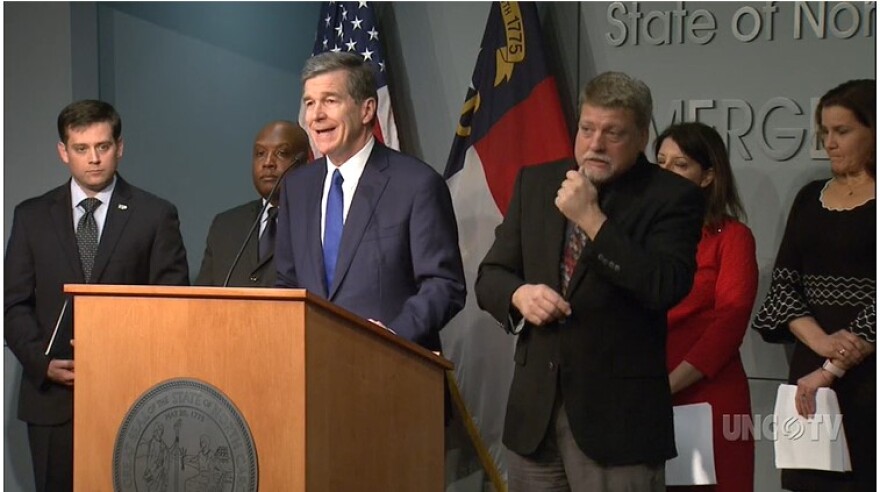Updated 5:10 p.m.
North Carolina Gov. Roy Cooper is ordering all restaurants and bars in the state to close for dine-in customers as the region scrambles to slow the spread of the coronavirus. Takeout and delivery services will be allowed to continue.
Cooper's order, which went into effect at 5 p.m. Tuesday, was issued in part because "it is likely that we have community spread which has yet to show up in the testing," he said at a press conference in Raleigh.
As of Tuesday morning, the state was reporting 40 cases of COVID-19, the respiratory disease caused by the coronavirus. South Carolina was reporting 47 by Tuesday evening, including one fatal case.
But North Carolina's latest numbers don't include the latest four cases reported this morning by Mecklenburg County health officials.
Cooper's executive order will also include an expansion of unemployment insurance to help workers impacted by closures because of the virus.
— Governor Roy Cooper (@NC_Governor) March 17, 2020
With the news, many Charlotte-area restaurants are reeling.
“I’m scared,” said Courtney Varnum, general manager at Zada Jane’s Corner Cafe in the Plaza Midwood neighborhood. “I mean, sure, to-go food is a thing. But for somebody that lives off of a tipped wage, it’s going to be difficult.”

Zada Jane’s has about 25 employees, according to Varnum, many of whom have second jobs at other restaurants.
“A lot of us have kids and things and bills and stuff," Varnum said. "Hopefully ... I don’t know. I’m at a loss."
Morgan Kuchenbrod was having pancakes at Zada Jane's Tuesday with a fellow freshman from North Carolina State University.
“I feel like if you just recommend that people don’t go [to restaurants and bars], it’s not gonna do anything," she said. "I feel like people won’t respond unless it’s an order.”
The school, like most universities in the state, has migrated to online classes for the foreseeable future. Kuchenbrod said she understands the executive order could help prevent the spread of the coronavirus and that she will find other ways to see her friends.
About a block away, at Nova’s Bakery, owner Saldjana Novakovic said she was in a “panic” and expects the impact of the closure to be “really bad” for her business. Novakovic added that employees will not be able to bake bread for the business if they are forced to stay at home.
In Davidson, Bill Schutz, who owns two restaurants on the town’s Main Street -- Mandolino’s Pizza and the upscale Flatiron Kitchen -- had a busy day Tuesday.

“I’ve spent the last hour calling good employees, some who have families and some who don’t, and letting them know that they don’t have a job any longer, until further notice,” Schutz said.
Schutz said he is scaling back the restaurants’ hours and reconfiguring the menus to attract carryout customers.
The governor acknowledged the development will lead to job losses, saying the decision was a tough one.
"This will be a hardship not only for the restaurant owners, many of whom have voluntarily closed, but also their customers who find comfort in their chairs and tables," Cooper said Tuesday afternoon. "It will also be a hardship on employees who depend on them for their jobs."
Cooper's executive order expands unemployment benefits by removing a one-week waiting period for people to apply, removing a requirement that forces people to look for work while applying and allowing people to apply for unemployment online or via phone. It also allows people who lose their jobs or have hours reduced directly due to coronavirus-related issues to apply for unemployment and lets employers off the hook for benefits paid because of the virus.
"The new reality is people will be losing jobs and businesses have lost customers," Cooper said. "These are unsettling times. I know some people are afraid. Some are angry. Many are worried. But we will get through this. ... Some things are just going to have to change for a while."
Grocery stores and pharmacies will remain open.
"I know there's a tendency to stockpile food in emergencies, but I urge people not to go overboard," Cooper said. "Leave some for others, especially those who can't afford to buy a lot of food at once."
State Health and Human Services Secretary Mandy Cohen said coronavirus testing is expanding in the state, including through universities and private labs.
At this time, the state is not changing its order limiting crowds to 100 people. Mecklenburg County has limited crowds to 50 in accordance with guidance from the Centers for Disease Control and Prevention, and the White House is asking people to avoid crowds of more than 10.
-- WFAE's David Boraks and Jodie Valade contributed.
Click here for the latest coronavirus news on WFAE’s live blog.
Sign up here for The Frequency, WFAE’s daily email newsletter.
What questions do you have about the coronavirus? What has this experience been like for you? Share your questions below.
_




